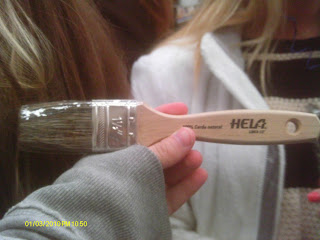Today we finished all of our company visits by touring HELA, Centauros and Bosques del Mauco.
HELA was interesting because it was the first time I saw a product assembled by hand. HELA has machines do more tedious and difficult work, such as printing patterns and logos into metal sheets or attaching metal bristles on a brush. In short, the machines make the individual parts and the workers assemble the individual parts to create the final product.
HELA does make various tools but they focus more on the production of brushes. This is because brushes are used very often and always need to be replaced, so brushes are the most profitable tool. The company representatives spent a lot of time showing us how they produce paint brushes. HELA uses wooden handles for their paint brushes (rather than other materials) because wood is an easily available resource and wood is easier to clean when it gets paint on it. Also, HELA uses wild boar hair for the bristles of the paint brushes. Wild boar hair is an ideal material for paint brush bristles because it develops split ends like human hair does which allows the paint brush to cover more area during painting. During the company presentation for HELA, I developed the impression that HELA only distributed and sold its products within the country. However, HELA ships their products all over Latin America.
Centauros was one of my favorite companies that we visited. Centauros has been operating for over 100 years and focuses primarily on processing and packaging tomato products.
They make various tomato products (like paste, sauce and ketchup), but the first few steps to create each product are the same. First, the tomatoes are washed and possibly skinned. Next, the tomatoes are crushed and strained. Finally, the remaining tomato pulp is piped to a machine that evaporates the water in the pulp, resulting in a tomato paste that can be further processed into other products. What I really liked about Centauros was their commitment to having the freshest, most natural products. They do this by washing their fruit, vegetables and machines only with water and they do not put any preservatives in any of their products. Centauros also has prepared canned meals, one of which we got to take home as a souvenir! These were originally created for miners in 1908 because they needed meals that they could quickly heat. This same idea of prepared food is what is motivating Centauros to become the first company to produce prepared onions. They are hoping to sell prepared onions to restaurants that make empanadas because these restaurants want onions that have already been peeled, chopped and cooked and only need heated. Centauros is hopeful that prepared onions will be just as successful as their tomato products.
The last company we visited was Bosques del Mauco, the largest mushroom producing company in the entire country. Although it was not my favorite company that we visited (mostly because of the awful smell!), it was still interesting to see how the mushrooms were grown, processed, packaged and distributed.
The company representative spent a lot of time describing how the compost for the mushrooms is made. It is clearly the most important step in producing the mushrooms. The main ingredients in the compost are horse manure, chicken manure, straw and water. The compost goes through different stages, and a specific stage can be identified by the color of the compost. In order to grow the mushrooms, the compost must be black. I was really surprised when I saw that the mushrooms are actually harvested by hand. I also found it surprising that the wooden trays that the company grows the mushrooms in can only be used three times; however, Bosques del Mauco shreds the trays into wood chips to be recycled.
Tomorrow is our spa day, so I am definitely looking forward to relaxing after this long day of company visits!






No comments:
Post a Comment